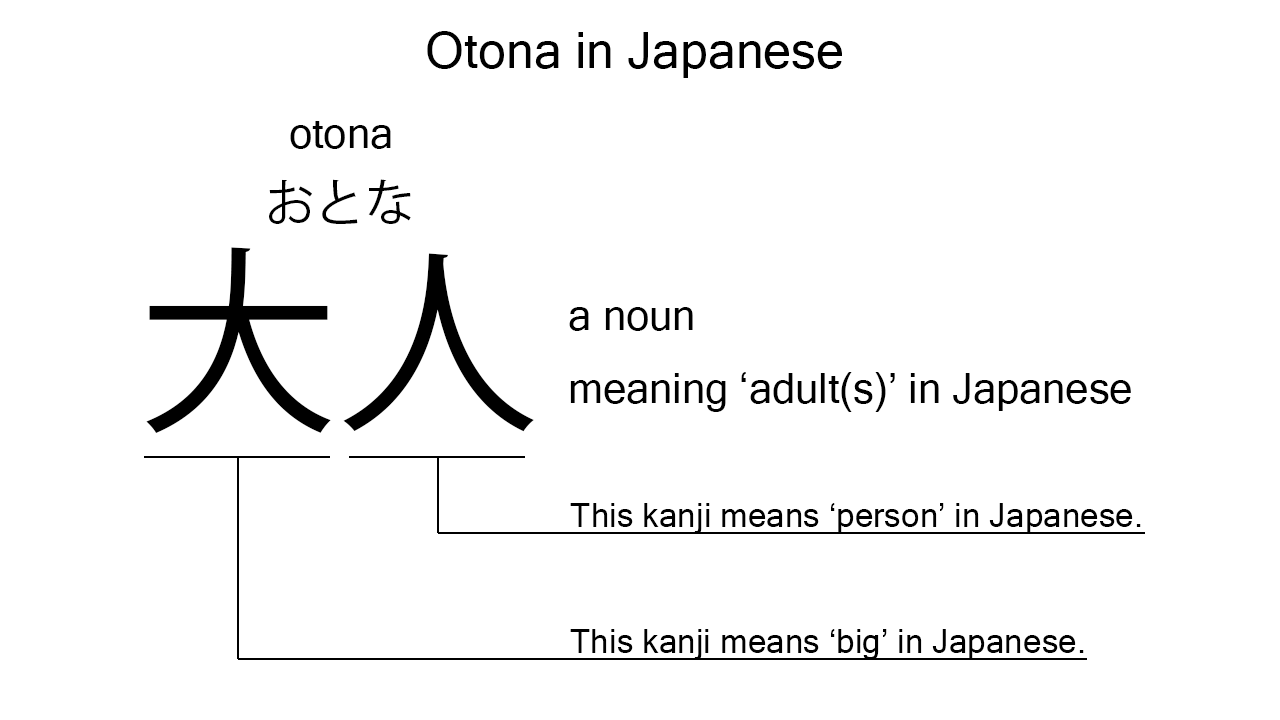What does “otona” mean in Japanese?
Native speakers say “otona” to mean ‘adult’ in Japanese. Probably, many Japanese learners know this word as it is often used in Japanese conversations. In this blog post, however, I will explain this word in detail based on its kanji expression. And also, I will explain how to use it through example sentences. My explanations would help Japanese learners understand “otona” more clearly. Then, let’s get started!
Contents
Definition and meanings of “otona”
Let me start with the definition and meanings of “otona”.
- otona – 大人 (おとな) : a noun meaning ‘adult’ in Japanese. This can also work as plural. Learn more about Japanese plural. Depending on the context and situation, this can also work like an adjective to mean ‘adult’, ‘mature’, or ‘grown-up’.
Grammatically, this is a noun. Sometimes, however, native speakers use this like an adjective. In Japanese, the border between nouns and some adjectives called na-adjectives is very ambiguous. Many na-adjectives consist of a noun and a conjugative suffix. And native speakers often omit the suffix especially in speaking. So, Japanese nouns can often work like the shortened versions of the corresponding na-adjectives. “Otona” is one of them. This is why it can work like an adjective to mean ‘adult’, ‘mature’, or ‘grown-up’ in Japanese.
The definition and meanings are not that difficult, I think. To understand this noun more clearly, however, let me explain its kanji characters in detail, one by one.
Otona in kanji
The kanji expression of “otona” consists of the following two kanji characters:
- 大 : a kanji character widely used to mean ‘big’ in Japanese.
- 人 : a kanji character widely used to mean ‘person’ in Japanese.
These two kanji characters tell us that “otona” literally means a ‘big person’ in Japanese. This literal interpretation is not completely in line with the actual meanings, but still understandable, I think. Adults are often bigger than children.

When we meet new kanji expressions, we should check their kanji characters in detail to understand their meanings clearly and deeply. In many cases, kanji characters tell us a lot about the meanings of the expressions they form. Actually, here, we could get the better understanding of “otona” through the detailed kanji check above.
So far, I’ve explained the definition and meanings of “otona” together with its kanji characters. Then, let me explain how to use it through the example sentences below.
Example #1: how to say “adult” in Japanese
watashi wa otona ni nat ta – 私は大人になった (わたしはおとなになった)
I became an adult.
Below are the new words used in the example sentence.
- watashi – 私 (わたし) : a pronoun meaning ‘I’ in Japanese.
- wa – は : a binding particle working as a case marker or topic marker. In the example, this works after “watashi” to make the subject in the sentence.
- ni – に : a case particle used to say what someone or something becomes after a change or action. In the example, this is used after “otona” to say what the speaker became.
- nat – なっ : one conjugation of the verb, “naru”, which means ‘to become’, ‘to turn’, ‘to get’, or such in Japanese. In the example, it has been conjugated for the better connection with its following word.
- ta – た : an auxiliary verb used after a verb, adjective, or auxiliary verb to make its past tense form. Probably, this is well known as a part of Japanese ta form. In the example, this is used after “nat” to make its past tense form, “nat ta”.
This is a typical usage of “otona”. In this example, it works as a part of the commonly-used phrase, “otona ni nat ta”, which means ‘to have become an adult’ in Japanese. This phrase should be learnt together with its present tense form, “otona ni naru”, I think.
Example #2: another usage of “otona”
kanojo wa boku yori zutto otona desu – 彼女は僕よりずっと大人です (かのじょはぼくよりずっとおとなです)
She is much more mature than I am.
Below are the new words used in the example sentence.
- kanojo – 彼女 (かのじょ) : a pronoun meaning ‘she’ in Japanese.
- boku – 僕 (ぼく) : a pronoun meaning ‘I’ in Japanese. This is used mainly by boys and young males.
- yori – より : a case particle working as a comparison marker. In the example, this works after “boku” to indicate the object which “kanojo” is compared with. Word orders in Japanese and English are different, but the role of this case particle is similar to that of “than”.
- zutto – ずっと : an adverb meaning ‘much’, ‘by far’, or such in Japanese.
- desu – です : an auxiliary verb used after a noun or adjective to make it polite. Probably, this is well known as a part of Japanese desu form. In the example, this is used after “otona” to make it sound polite.
This is another typical usage of “otona”. In this example, it works like an adjective to say “mature” in Japanese. When we want to say “mature”, “adult”, or “grown-up” in Japanese, “otona” is a good option.
Summary
In this blog post, I’ve explained the definition and meanings of “otona” in detail based on its kanji expression. And also, I’ve explained how to use it through the example sentences. Let me summarize them as follows.
- otona – 大人 (おとな) : a noun meaning ‘adult’ in Japanese. This can also work as plural. Depending on the context and situation, this can also work like an adjective to mean ‘adult’, ‘mature’, or ‘grown-up’. These two kanji characters literally mean a ‘big person’. This literal interpretation is not completely in line with the actual meanings, but still understandable, I think. Adults are often bigger than children.
Hope my explanations are understandable and helpful for Japanese.